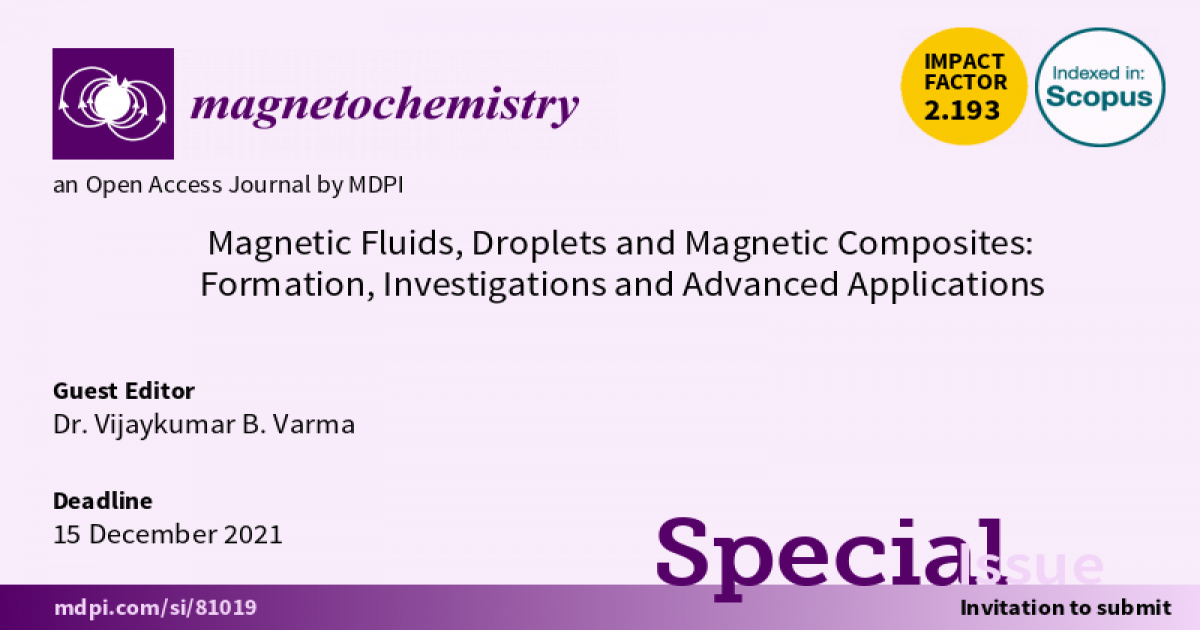Magnetic Fluids, Droplets and Magnetic Composites: Formation, Investigations and Advanced Applications
A special issue of Magnetochemistry (ISSN 2312-7481). This special issue belongs to the section "Magnetic Materials".
Deadline for manuscript submissions: closed (15 December 2021) | Viewed by 3109

Special Issue Editor
Interests: experiments and simulations of magnetic fluids, magnetic droplets, Janus particles, and magnetic composites for lab-on-a-chip; microfluidics, heat–mass transfer, energy harvesting, biosensing, and drug delivery applications
Special Issues, Collections and Topics in MDPI journals
Special Issue Information
Dear Colleagues,
As the Guest Editor, I invite your recent, novel, and interesting findings for publication in the Magnetochemistry Journal’s Special Issue on “Magnetic Fluids, Droplets, and Magnetic Composites: Formation, Investigations, and Advanced Applications.”
This Special Issue will include, but is not limited to, the following topics of high interest:
- Experiments, modeling, and simulations of chemical and physical properties of magnetic fluid development (design, synthesis), stability, property enhancements, and the effect of surfactants, viscosity, and magnetic properties of particles on the same;
- Effect of uniform or non-uniform magnetic fields on magnetic fluids, droplets, or magnetic composites;
- Interdisciplinary regimes of magnetic fluids or magnetic droplets for Lab-on-a-Chip, microfluidics, heat-mass transfer, energy harvesting, biosensing, or biomedical applications and devices;
- Development and advanced applications of magnetic composites, magnetic Janus structures, and Janus particles.
For further details, please click here: www.mdpi.com/journal/magnetochemistry
I look forward to hearing from you!
Dr. Vijaykumar B. Varma
Guest Editor
Manuscript Submission Information
Manuscripts should be submitted online at www.mdpi.com by registering and logging in to this website. Once you are registered, click here to go to the submission form. Manuscripts can be submitted until the deadline. All submissions that pass pre-check are peer-reviewed. Accepted papers will be published continuously in the journal (as soon as accepted) and will be listed together on the special issue website. Research articles, review articles as well as short communications are invited. For planned papers, a title and short abstract (about 100 words) can be sent to the Editorial Office for announcement on this website.
Submitted manuscripts should not have been published previously, nor be under consideration for publication elsewhere (except conference proceedings papers). All manuscripts are thoroughly refereed through a single-blind peer-review process. A guide for authors and other relevant information for submission of manuscripts is available on the Instructions for Authors page. Magnetochemistry is an international peer-reviewed open access monthly journal published by MDPI.
Please visit the Instructions for Authors page before submitting a manuscript. The Article Processing Charge (APC) for publication in this open access journal is 2200 CHF (Swiss Francs). Submitted papers should be well formatted and use good English. Authors may use MDPI's English editing service prior to publication or during author revisions.
Keywords
- magnetic fluids
- ferrofluids
- magnetic droplets
- magnetic composites
- Janus particles
- magnetic fields
- magnetofluidics
- biomedical
- biosensing
- heat–mass transfer
- energy harvesting
Benefits of Publishing in a Special Issue
- Ease of navigation: Grouping papers by topic helps scholars navigate broad scope journals more efficiently.
- Greater discoverability: Special Issues support the reach and impact of scientific research. Articles in Special Issues are more discoverable and cited more frequently.
- Expansion of research network: Special Issues facilitate connections among authors, fostering scientific collaborations.
- External promotion: Articles in Special Issues are often promoted through the journal's social media, increasing their visibility.
- e-Book format: Special Issues with more than 10 articles can be published as dedicated e-books, ensuring wide and rapid dissemination.
Further information on MDPI's Special Issue polices can be found here.





